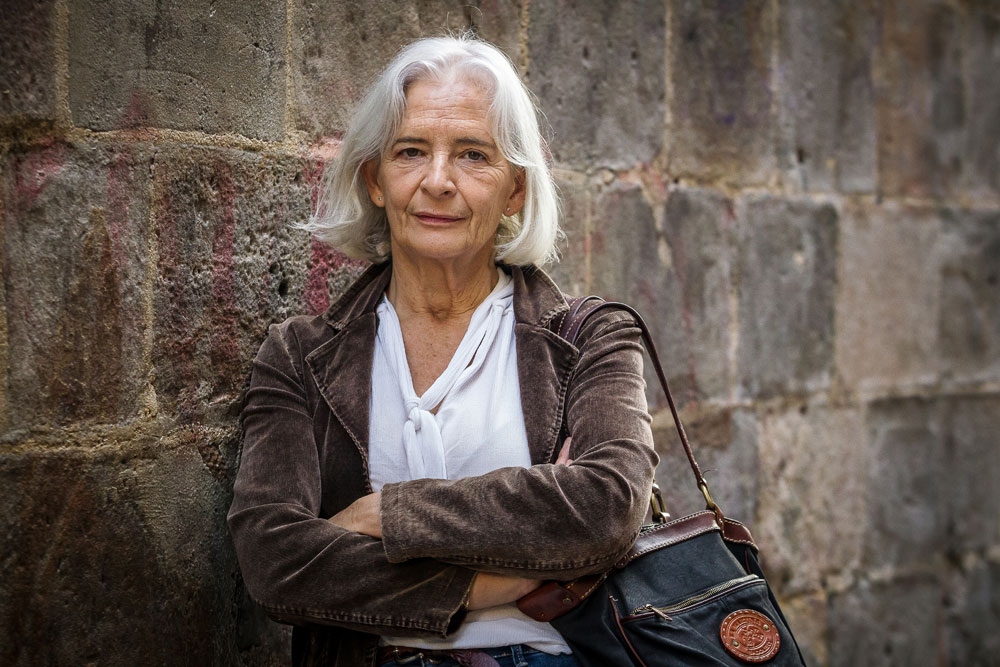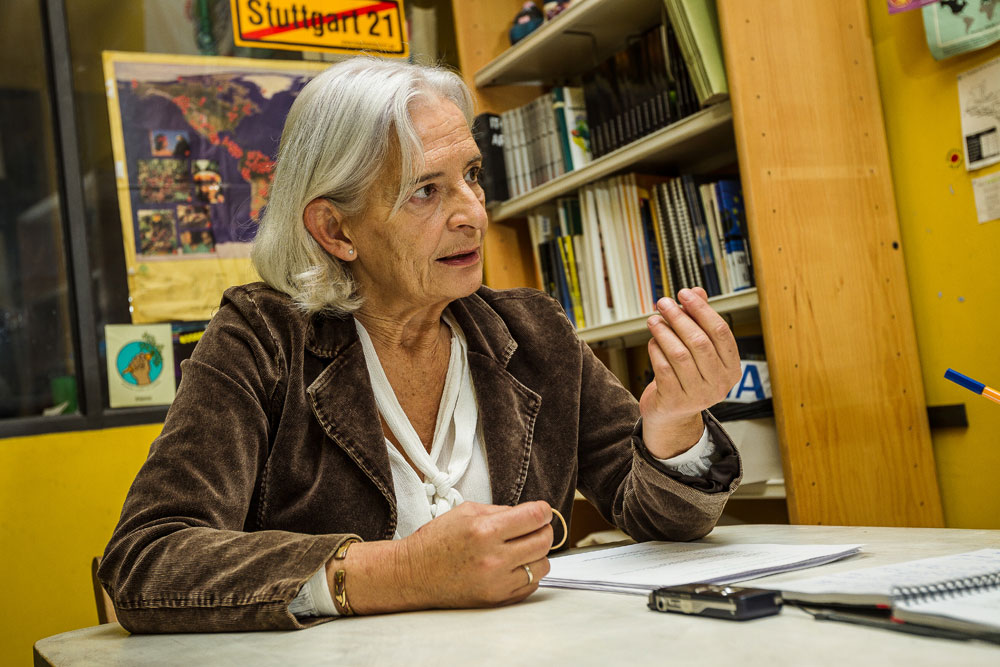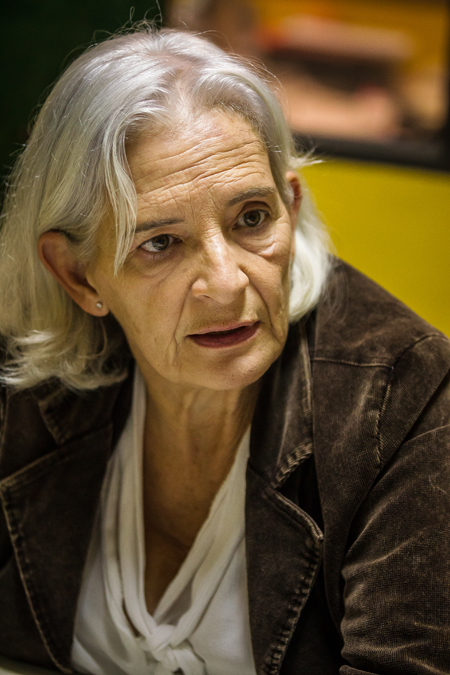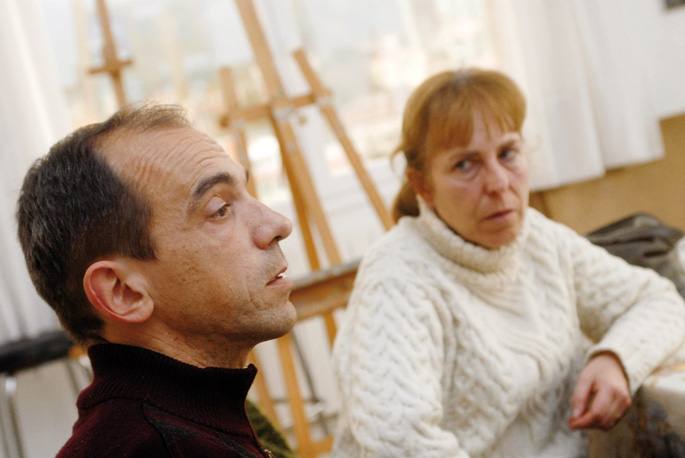"Let governments say that Petronor is strategic, but let's discuss clearly the consequences of having a refinery in the middle of a village."
- Cristina Álvarez Baquerizo, a Madrid environmental lawyer, is the daughter of Biscayan parents. And in recent years he has had to come to Bizkaia, as he is a lawyer for several Muskiz neighbours who are working against Petronor’s activity. When the road began he thought it was going to be brief, now he seems to be acting forever in the processes against Petronor. “For my part, great.”

Your first contact with Muskiz was in 2008, when the City Hall hired you.
The City Hall wanted to carry out a study on the project of expansion of the Petronor refinery and took out a public tender. I won. The City Hall was still against enlargement and I was informed. In any case, I was asked to make a serious, documented, unbiased report.
It wasn't an easy job.
He had been a lawyer for 30 years and had seen nothing better than the dossier he had received. Thousands of files distributed in different folders, without naming them, without indexes… We tried to get an orderly report from the Basque Government, and they answered us more or less like this: “But can anyone believe that someone can read the entire dossier?” This totally amazed me. Well, we started analyzing and we realized that Petronor was always working without an activity license. Nobody thought I was going to need it.
“The environmental impact study carried out for the granting of the authorization to Petronor did not take into account the health of the population”
This authorisation will already have it.
Yes, of course. At the moment, however, the activity licence is not granted, which is granted to such industries is the Integrated Environmental Authorisation (AAI). And that is what Petronor has, given by the Basque Government through a curious procedure. In fact, it has been granted ten permits, one after the other and each complementing the previous one. We have started proceedings against all of them.
When he says “we’ve started”, does he mean groups of Muskiz’s neighbours?
Yes. In particular, I have worked for the coordinator Meatzaldea Bizirik in recent years for free. When I finished my work for the City Hall, I realized that they no longer intended to fight Petronor. But in the meantime, I had the opportunity to meet the people; when I organized the coordinator, I offered to work for them. I was already aware of the matter, having examined thousands of files. But I would never have believed that the issue was going to last so long.
Firstly, they opposed the activity licences granted to Petronor by the municipalities of Muskiz and Abanto.
Yes. If I have to tell you the truth, I thought at that time: “They will be forced to close the refinery tomorrow.” I thought it would be a simple matter, which would ask us only a little bit of time and a little bit of work. There were so many legal breaches... The procedures against the authorizations granted by Abanto and Muskiz have been loosely won at the Bilbao Dispute Administrative Court. However, Petronor appealed the judgment and the High Court of Justice of the Basque Country (TSJPV) gave the plaintiffs the right. We also lost the resources against the AAI presented by the Basque Government. All these issues were resolved in the same TSJPV room.
He says the way IBB was given was curious. The Basque Government granted ten permits, each additional to the previous one, and it had to appeal against all.
That is another extraordinary thing that has happened in this matter. The Spanish law regulating these authorizations establishes a procedure for the granting of an AAI and establishes a strict system for its modification. It cannot be changed for anything that the Basque Government considers appropriate. But in this case, the changes have been caused by causes not provided for by law. By the way, this has created a huge imbalance in the conflict between Petronor and the citizens, among other things because for a while the law on types of justice imposed by Minister Gallardón was passed, and because we had to be very careful when deciding what resource to put in. Now, at least, we can walk peacefully on that side.
After the TSJPV was right for Petronor, they went to the Spanish High Court of Justice, which also advocated the refinery. That was in March 2016.
Yes. They claimed that the authorisation was well granted, but the judgment did not analyse our arguments.

What arguments?
I thought we were finally going to be right, especially for one thing. The environmental impact studies carried out before the issuance of the AAI did not take into account the impact on health. The law leaves no doubt about this, but that analysis has never been done. In 2008, the Director General of Public Health of the Basque Government issued a report saying that he had nothing to say, because there was no health information. In one of the TSJPV procedures, we asked for your testimony, and the same thing he said. That was recognised by the court, but it is incredible that it does not know anything about the health of the citizens. Because it's a lie. The first data on the mortality atlas at the CAPV were already published at the time when we were developing these processes, and it was found that in the villages of the region there was a higher mortality due to respiratory tract cancer. If you are asked for permission to expand a refinery with that data, which will mean thousands of tons of contaminants more per year, the first thing a Director of Public Health has to do is ask for time to perform a risk analysis. I thought I would take into account that lack of attention from the Supreme Court to health impacts, but basically he told us that we had to demonstrate the cause-effect relationship.
Does this not conflict with the principle of prudence?
Yes. I was partly reassured by the fact that a few months before the Supreme Court handed down a judgment, the European Environment Agency (EEA) convened a meeting. The EIA produces every two years a report, called Late Lessons from Early Alerts, in which the non-adoption of the precautionary principle in the authorization of activities or products analyzes the cases that have caused damage to human health and the environment, and the agency selected us to present our case. A former EIA director, Domingo Jiménez Beltrán, told us that one of the most serious violations committed by the Basque Government in the case of Petronor was the failure to adopt the precautionary principle.
“Legislation is one thing and another is what would be recommended from a health point of view. In Europe, air quality standards have been weakened since 2006”
Once the roads in the Spanish State have been exhausted, they have been directed towards Europe.
Yes, in summer we lodged a complaint with the European Commission. But it may well be that he does not get anything in that direction.
There are other ways.
Yes, on the one hand, the location of the refinery and on the other, the operation of the refinery. Regarding this second aspect, our intention is to bring a group of international environmental evaluators. We want to analyse the situation of the environment, as the Basque Government does not. And for that we need a lot of international support and a lot of money, in addition to time. At the moment, we do not have this path open.
The Basque Government, Petronor… say that there are air quality measurements and that they are always within the law.
Legislation is one thing and another is what is recommended from a health point of view. Since 2006, air quality laws in Europe have been weakening. Year after year, the European Environment Agency itself criticises it. Among other things, international protocols are not being ratified. A clear example is the Gothenburg Protocol. If applied here, Petronor should close it.
What does that protocol say?
That the values of air pollutants should be as close as possible to those recommended by the World Health Organization.
Petronor shall not be the only polluting agent in the region.
No, of course. But yes, the biggest, of course. Traffic in pollutant emissions is increasingly being blamed, but data indicate that for all pollutants, except nitrogen oxide, industrial activity is the main source. However, we are in crisis, and as industry needs help, control has been weakened. On the other hand, air quality data are not accurate, since the measurement method is not adequate.

Why do you say that?
There are several reasons, but one of the most important in the case of Petronor is that the law allows us to suspend measurements while the refinery carries out stops and restarts. In refineries, an expert will tell you that the goal is to know how much is spread under normal working conditions, but Petronor, for example, has invested 30% of the time in the stop or reactivation phases in 2016, in which the episodes of greatest contamination occur.
You say that the other road you are working on is the location of the refinery. First, because of its proximity to the coast, in the area regulated by the Spanish Coast Law.
From the beginning I was very surprised that the Coasts Directorate never said anything about Petronor. Not before, or after the amendment of the 2011 law.
What legal change does it mean?
The refinery has worked thanks to a concession of 1972 that had been exhausted in 2012. We counted the months to reach that point, because the law is strict and does not allow for any extension of this type of concessions. We always thought they would have to do something by the time 2012 came, and yes, like something happened. In December 2011, the debate began in the Congress of Deputies on a bill on sustainable economy. In the context of the debate, the PSOE, following a pact with the PNV, as was later heard, presented an amendment amending an article of the Hydrocarbons Act. The change was that the concessions of the refineries on the coast could be extended. In the case of Petronor, another 30 years. This amendment was not discussed. They voted in a hurry and it was over. In addition, the amendment states that, once the extension is requested, it is granted automatically, that is, Petronor can stay where it is without a document authorising the moratorium for 30 years. Reports by several legal professors say that this is scandalous. Maybe we'll also open that path someday.

At the moment, Petronor's location is legal.
Yes, and against that we cannot do anything, but yes, the Coasts Directorate has never done anything, and that is precisely what we have denounced in the National Hearing. Petronor submits a single claim to this complaint: it has not been established that they are in the coastal zone. And it's true. It didn’t occur to me to present a map, a photo… So, this may also be lost.
You have described the 2011 change of law as “repugnant.”
That is true. If the Basque Government and the Spanish Government believe that Petronor’s activity is strategic to the economy of the Basque Country, let it be told. But with all the cards on the table, not intriguing. And let's talk about the consequences of having a refinery, because they can't say it's the same as having a bakery. Activity is dangerous and the centre of a people is not the right place for it. Let us talk about it and, once said, let us clarify whether everyone is in favour of the current location of the refinery. By the way, it would be good to remove some of that great economic input that Petronor attributes to the economy to compensate for the environmental and health impact. Two years ago, the European Environment Agency published important work on public expenditure generated by polluting companies in Europe. These include refineries.
Azken hilabetetan izandako lan gatazketan auzipetuak izan diren beharginek agerraldia egin dute Eusko Jaurlaritzaren aurrean, langile borrokaren kriminalizazioa salatzeko. Mobilizazioak iragarri dituzte.
Petróleos del Norte enpresaren akronimoa da Petronor. Petrolioaren industriako enpresa da eta Bizkaiko Muskizen dauka egoitza soziala. Instalazio nagusiak ere herri horretan dauzka, Kantabriako mugan, La Arena hondartza ezagunaren ondoan. Petronor 1968an legeztatu zen... [+]
2008ko udan sortu zen Meatzaldea Bizirik elkarte ekologista izen bereko eskualdean, Cokearen Aurkako Koordinadoraren segida modura eta bide batez hari izaera legala emateko. Otsailaren 12rako manifestazioa deitu dute Muskizen, Petronorren ate aurrean, findegiari bertan... [+]






















